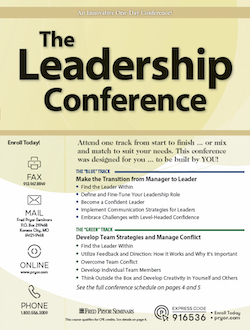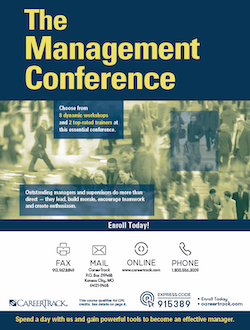Women in Leadership
- Author: Sheryl McAtee
- Categories:
- Tags:
- Share on:
We recently worked with a female leader who had gotten feedback from a 360-degree feedback exercise. The feedback was positive, with constructive comments on the leader’s strengths and a few suggestions for expanding her impact as the organization grew. This leader was clearly making a positive difference in her organization.
Several of the feedback providers noted that the leader had a “strong personality” – others noted she was a “force of nature.” These comments were among the positive ones, noting the leader’s self-confidence and knowledge, and ability to drive results despite complexity and hurdles.
Many women, however, hear the feedback “strong personality” in a somewhat less positive light. Including this leader. “Strong personality?” this leader said. “When did you last hear a man described as having a strong personality!?” Oscillating between anger and self-doubt, the leader set aside all the positive feedback, and instead focused in on the skills she needed to develop to be softer, gentler, less strong.
SAVE $10 AND TRAIN ON THIS TOPIC TODAY
This is not an unusual internal conflict for women leaders.
Women leaders are expected to lead organizations and make the tough decisions, but also to be the gentle mother, sister and friend. What are the most effective leadership skills and characteristics for these strong women, who are making a difference in their organizations, and yet feel internal and external demands to be gentler and more feminine?
Here are three tips for these women making a difference:
- Be yourself. As basic as it sounds, you can only show up as yourself. The key is being your best self – getting enough sleep, eating well and noticing and managing your reactions to others.
- Notice your impact and calibrate. Some people are more comfortable working with strong woman leaders than others. To maximize effectiveness, it is true that sometimes, women do need to adopt softer approaches to maximize their impact. It is easy to respond that it is a double standard to expect this of women but not men. However, it is worth considering that male would do well to do the same.
- Embrace your role. You are in your role for a reason. You are making a difference every day. Accept feedback, keep learning, course correct where needed and find peace.
Choose a Seminar and Save $10
Styles & Strategies to Supervise Effectively
1 Day
- CEU: 0.6
- CPE: 6
Team Training - Virtual or In-person

Spark Innovation and Think Strategically
1 Day
- CEU: 0.6
- CPE: 6
Team Training - Virtual or In-person

How to Manage Remote Employees
1 Day
- CEU: 0.6
- CPE: 6
- HRCI: 5.5
- PDC: 6
Team Training - Virtual or In-person
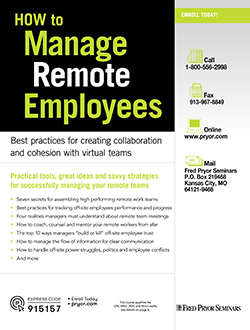
How to Supervise People
1 Day
- CEU: 0.6
- CPE: 6
- PDC: 6
Virtual Seminars:
-
Apr 17
-
Apr 22
-
Apr 24
-
+ 25 more dates
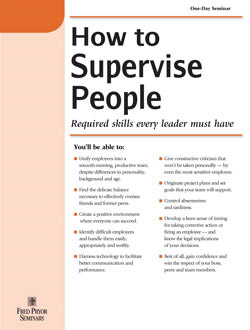
Managing with Assertive Confidence
1 Day
- CEU: 0.6
- CPE: 6
Virtual Seminars:
-
Apr 22
-
May 8
-
May 13
-
+ 2 more dates

Facilities Management - A 2-Day Comprehensive Course
2 Days
- CEU: 1.2
- CPE: 12
Virtual Seminars:
-
Apr 23-24
-
Apr 29-30
-
May 1-2
-
+ 24 more dates

Leadership, Team-Building and Coaching Skills for Managers and Supervisors
1 Day
- CEU: 0.6
- CPE: 6
- HRCI: 5.5
- PDC: 6
- PDU: 6
Virtual Seminars:
-
Apr 17
-
Apr 18
-
Apr 22
-
+ 40 more dates
In-Person Events:
- Apr 22, Indianapolis, IN
- Apr 23, Chicago, IL
-
+ 19 more dates

Leadership & Management Skills for Women
1 Day
- CEU: 0.6
- CPE: 6
Virtual Seminars:
-
Apr 17
-
Apr 29
-
May 7
-
+ 8 more dates

How to Supervise Bad Attitudes and Negative Behaviors
1 Day
- CEU: 0.6
- CPE: 6
- HRCI: 5.5
- PDC: 6
Virtual Seminars:
-
Apr 17
-
Apr 22
-
Apr 25
-
+ 18 more dates

Management & Leadership Skills for New Managers and Supervisors (2-Day)
2 Days
- CEU: 1.2
- CPE: 12
Virtual Seminars:
-
Apr 17-18
-
Apr 22-23
-
Apr 24-25
-
+ 32 more dates
In-Person Events:
- Apr 29-30, Denver, CO
- May 1-2, Portland, OR
-
+ 20 more dates

How Managers Become Great Leaders
1 Day
- CEU: 0.6
- CPE: 6
Virtual Seminars:
-
Apr 17
-
Apr 18
-
Apr 23
-
+ 16 more dates
In-Person Events:
- Jul 22, Nashville, TN
- Jul 25, Las Vegas, NV

Transitioning to Supervisor
1 Day
- CEU: 0.6
- CPE: 6
Virtual Seminars:
-
Apr 17
-
Apr 18
-
Apr 22
-
+ 41 more dates
In-Person Events:
- Apr 22, Phoenix, AZ
- Apr 23, Ontario, CA
-
+ 14 more dates
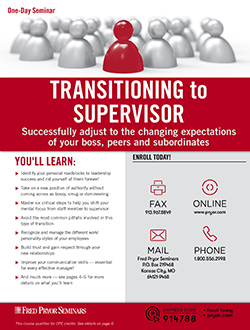
A Crash Course for the First-Time Manager or Supervisor
1 Day
- CEU: 0.6
- CPE: 6
- HRCI: 5.5
- PDC: 6
Virtual Seminars:
-
Apr 18
-
Apr 22
-
Apr 24
-
+ 27 more dates
In-Person Events:
- Jun 13, Phoenix, AZ
- Jun 18, New York, NY
-
+ 2 more dates

Criticism & Discipline Skills for Managers and Supervisors
1 Day
- CEU: 0.6
- CPE: 6
- HRCI: 5.5
- PDU: 6
Virtual Seminars:
-
Apr 23
-
May 6
-
May 15
-
+ 13 more dates

The Indispensable Office Manager
1 Day
- CEU: 0.6
- CPE: 6
Virtual Seminars:
-
Apr 23
-
May 1
-
May 6
-
+ 5 more dates

Be the Manager Your Employees Want to Follow
1 Day
- CEU: 0.6
- CPE: 6
- PDC: 6
Virtual Seminars:
-
May 5
-
May 8
-
May 14
-
+ 5 more dates

Creative Leadership
1 Day
- CEU: 0.6
- CPE: 6
- HRCI: 5.5
- PDC: 6
Virtual Seminars:
-
May 8
-
May 13
-
May 30
-
+ 4 more dates

How to Improve Employee Accountability with Remote and In-Person Teams
1 Day
- CEU: 0.6
- CPE: 6
- PDU: 6
Virtual Seminars:
-
Jun 3
-
Jun 9
-
Jun 18
-
+ 5 more dates

The Exceptional Team Leader
1 Day
- CEU: 0.6
Virtual Seminars:
-
Jun 3
-
Jun 9
-
Jun 18
-
+ 5 more dates

Basic Accounting Skills for the Business Professional
1 Day
- CEU: 0.6
- CPE: 6
- HRCI: 5.5
- PDC: 6
Virtual Seminars:
-
Jun 5
-
Jun 10
-
Jun 18
-
+ 5 more dates



